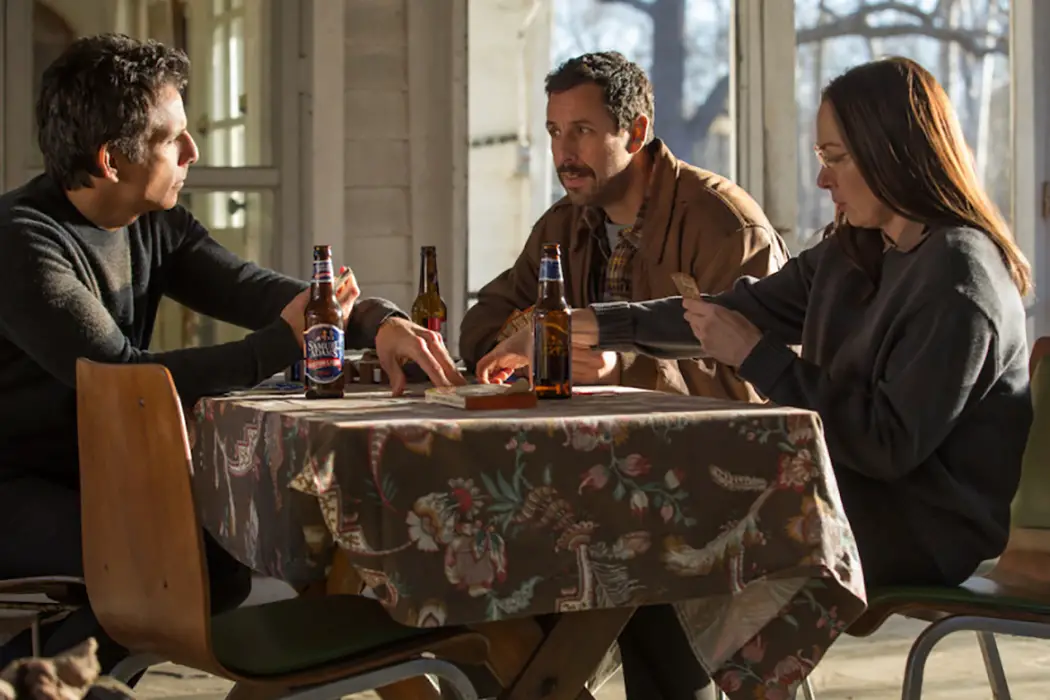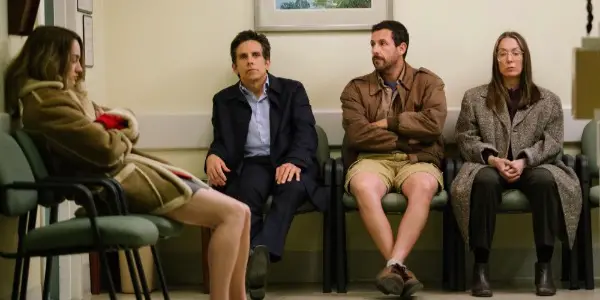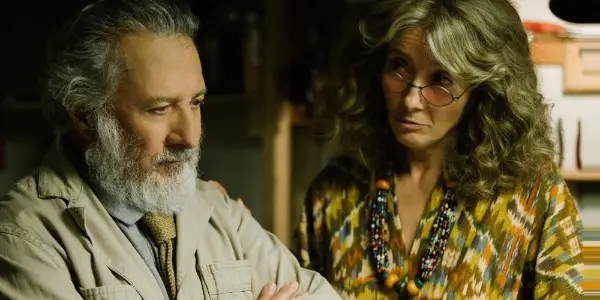THE MEYEROWITZ STORIES: Remember When Adam Sandler Was This Good?

Alistair is a 25 year old writer based in Cambridge.…
There are numerous things you come to expect from a Noah Baumbach film. Leading characters that could be accurately described as “hipsters”, with narratives that could charitably be described as first world problems, are perennially near the top of the list – even when his films are at their best, it’s hard to argue against these criticisms frequently thrown at the director. His new film, The Meyerowitz Stories (New and Selected), is the closest thing he has yet achieved to a departure from these recurrent factors in his work – he has peeled back some of the layers of detached character comedy to offer an emotionally affecting portrait of family life, that in its best moments, manages to be sincerely moving in a manner that feels revelatory for the director.
The Return of Adam Sandler
Not for the first time in his career, Baumbach’s attention here falls to that of the dysfunctional upper class family unit. Harold Meyerowitz (Dustin Hoffman) is a formerly successful sculptor and retired art professor who has invited his three children back to stay with him in New York. He’s unafraid of labelling them disappointments, which causes friction between Danny (Adam Sandler) and Jean (Elizabeth Marvel) and their half brother Matthew (Ben Stiller) – an LA based financial management executive who Harold believes is his only successful child, even if he begrudgingly accepts the success wasn’t through a career in the arts.
Danny arrives at his father’s home first, his failed attempts at a musical career proving to be the albatross around his neck when his dad speaks to him about his life. Danny is essentially the audience gateway to the Meyerowitz clan, the first family member we see arriving and having to contend with his father’s misplaced career-based myopia, as well as the drunken behaviour of his fourth wife (an effectively silly Emma Thompson), who has a penchant for cooking unusual meats, such as shark and pigeon. Once the other family members arrive, it becomes an effective tug of war between a bitter father and his quietly resentful children – in other words, a stereotypical Baumbach farce.

By now, you’ve likely heard that Sandler delivers the standout performance in the ensemble, his first performance since Funny People that feels like a genuine character and not some exhausted variation on his tired screen persona. Baumbach utilises Sandler in a way no other director has successfully achieved since even further back than that, mining his rage-fuelled slapstick in a way that naturally grounds it in the drama, in a manner not too dissimilar from Paul Thomas Anderson’s approach to collaborating with the actor in Punch Drunk Love.
The opening scene, where Sandler’s Danny attempts to find a parking space in crowded, gentrified New York, is a perfect example of this – he is firmly established as a believable character, and gives Sandler an opportunity to work his natural comedic talents (and not just appear tired and ready for the paycheck) in a manner unseen for over a decade.
But the reason Sandler’s performance works so exquisitely isn’t just because of the finely tuned bursts of foulmouthed comic anger. It’s because his character has, for my money, the most moving character arc of the entire film – adapting to life without his daughter (Grace Van Patten), as she leaves for college. He is seen relishing the past, using the last of their time together for cutesy piano sing-a-longs, before making repeat calls to her to attempt to talk about his feelings.
A typical Noah Baumbach film – but with an endearing empathy
We are living in something of a golden age for idealised screen father figures, with Mark Rylance’s Dunkirk-bound seaman in Christopher Nolan’s war epic and Michael Stuhlbarg’s kindly professorial dad in Call Me By Your Name both making strong impressions recently. Sandler’s Danny is another fantastic addition to this new lineage, a man whose failings in life have never got in the way of his responsibilities as a father – within the first ten minutes, after reciting a song he and his daughter wrote when she was nine years old, I was overwhelmingly moved in a manner I had not anticipated.

Even in his best performances, Sandler has played characters of overblown proportions that The Meyerowitz Stories struggled to contain within the narrative. In the film’s quietest moments, he proves himself to be an emotionally aware screen presence – and certainly made me long for a second wind in his career playing more understated, character-driven roles with directors who had a firm handle on his persona. Sure, there are plenty of overtly physical elements to the character (a running gag involves him walking with a limp if he sits down for too long), but it is testament to Baumbach’s direction that he manages to get his actor to underplay these moments. It feels like a realistic inconvenience and not a comic contrivance.
This isn’t to discredit the rest of the cast, who mostly put in amusing and engaging performances. But Sandler’s is the only one that feels largely divorced from being a stereotypical Baumbach character – the emotions he deals with may seem minor, but they strongly register because they are divorced from the idealistic upper class problems Baumbach merrily dissects elsewhere. Of course, there is still a plethora of winning, typically Baumbachian one liners; a brief dialogue exchange about misplaced organic hummus, delivered with a droll magnificence by Dustin Hoffman, registers The Meyerowitz Stories’s biggest laugh line – rivalled only by his delivery of the word “brazen” in response to a rude restaurant patron elsewhere.
But ultimately, there’s nothing in its comedic sights to separate it from several other films, of varying quality, in Baumbach’s back catalogue. If it wasn’t for the heavyweight central performance by Sandler, The Meyerowitz Stories would be more nakedly visible as a minor entry in his filmography – the only difference being an emotionally sincere approach to characterisation, as opposed to the usual scabrous satire at the pompous lifestyle led by his characters.
The Meyerowitz Stories: Conclusion
The Meyerowitz Stories may feel like business as usual for Baumbach, but it’s a quietly evolutionary step in his filmography, albeit one so subtle the film still feels comparatively minor compared to many of his previous efforts. A winning, wondrous and unexpectedly moving lead performance does make the film a joy to watch throughout, bringing a new found unironic empathy to the fold – it’s just a shame that outside of this central character study, very little new ground is being broken, boasting a narrative that’s thematically interchangeable with several of Baumbach’s earlier works.
With all this being said, it may be far from Baumbach’s best film, but it is without a doubt the easiest to warm to. Here’s hoping he keeps the warm, dryly comic yet effortlessly empathetic humanism a constant feature in his films to come.
What did you think of The Meyeorwitz Stories? What do you think is the best film in Noah Baumbach’s back catalogue?
The Meyerowitz Stories is now screening everywhere in the world on Netflix.
Does content like this matter to you?
Become a Member and support film journalism. Unlock access to all of Film Inquiry`s great articles. Join a community of like-minded readers who are passionate about cinema - get access to our private members Network, give back to independent filmmakers, and more.
Alistair is a 25 year old writer based in Cambridge. He has been writing about film since the start of 2014, and in addition to Film Inquiry, regularly contributes to Gay Essential and The Digital Fix, with additional bylines in Film Stories, the BFI and Vague Visages. Because of his work for Film Inquiry, he is a recognised member of GALECA, the Gay & Lesbian Entertainment Critics' Association.













